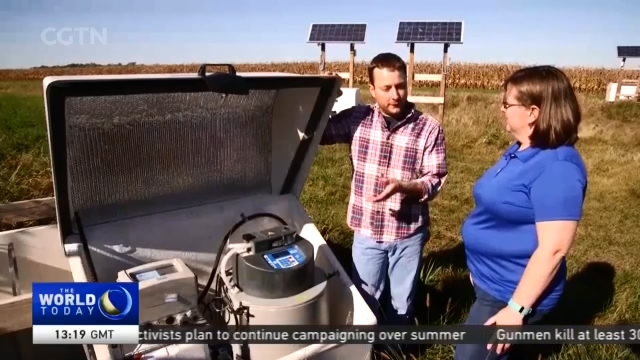
21:39, 21-Apr-2018
Greener Farming Techniques: New methods to reduce impact of fertilizer-based agriculture
02:04

Farmers in the United States are using new methods to prevent the run-off of fertilizer nutrients into urban water supplies. Gary Strieker reports.
In northwest Ohio, farmers are now taking more seriously how to manage the water that runs off their lands.
MEGHAN BURGESS NATURAL RESOURCES CONSERVATION SERVICE "Knowing what you're doing on your ground is important for your entire community."
Four years ago the city of Toledo ordered an emergency shutdown of its water supply after it was contaminated by a toxic algae bloom on Lake Erie, caused in large part by fertilizer runoff from farmlands.
BILL KELLOGG FARMER "Our conservation efforts started 25 years ago, then when the Toledo water crisis happened, we knew there was gonna be a backlash over it towards agriculture."
SHANE KELLOGG FARMER "We figured we better start doing our part out here, you know, to help cure that problem."
Conservation practices like cover crops and minimizing surface soil disturbance helps to keep nutrients like phosphorus in the soil, and to use less fertilizer.
"this is where we've strip-tilled. We're not putting more fertilizer out there than we need to. We're putting it in a narrow band."
"and up here we have a filter strip."
With federal government support, ongoing trials across the country are finding what practices are most effective in preventing nutrient runoff.
CHRIS KURT FARMER "These are the water testing stations that tests all the surface water that comes off our fields for nutrients that might be caught up in our water. The more nutrients that stay in the field, the less I have to apply in the future, hopefully the more money that gets put back in my pocket."
BILL KELLOGG FARMER "Conservation is somewhat a state of mind, and you have to want to do it."
With farmers cooperating voluntarily, there is progress in preventing runoff to ensure healthier soils and cleaner water for everyone.

SITEMAP
Copyright © 2018 CGTN. Beijing ICP prepared NO.16065310-3
Copyright © 2018 CGTN. Beijing ICP prepared NO.16065310-3